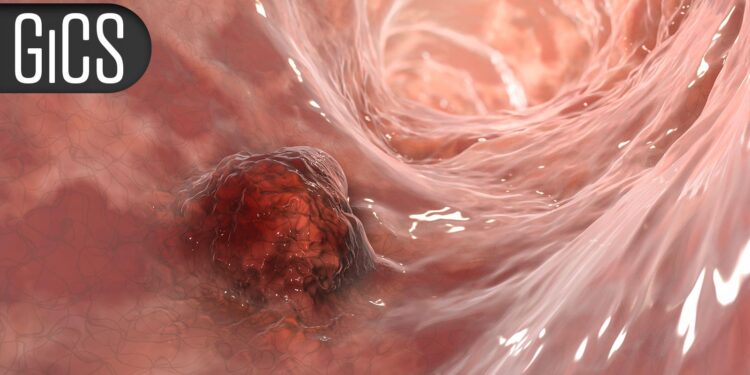[ad_1]
SAN FRANCISCO — In an era dominated by pricey, high-tech drugs, the humble aspirin had a practice-changing impact on colorectal cancer (CRC) recurrence, according to a randomized study reported here.
Patients with treated, PI3K-mutated early CRC had a 50-60% lower risk of recurrence at 3 years if they received 160 mg of aspirin daily. The benefit occurred in patients with PIK3CA exon 9/20 mutations, so-called “hot spot” mutations, and in patients with other types of PI3K mutations.
Aspirin’s beneficial effect on CRC recurrence translated into a 40-50% improvement in disease-free survival (DFS). The findings also confirmed PI3K mutations as a predictive biomarker for response to aspirin, reported Anna Martling, MD, PhD, of the Karolinska Institute in Stockholm, at the American Society of Clinical Oncology (ASCO) Gastrointestinal Cancers Symposium.
“Aspirin 160 mg reduced recurrence by more than 50% in colorectal cancer patients with tumors harboring mutations in the PI3 kinase pathway,” said Martling. “This is the first trial to show that mutations in this specific signaling pathway, beyond the PIK3CA mutations, predict aspirin response, expanding the targetable population to more than a third of patients.”
“This is also an example of the repurposing of a safe, inexpensive, and globally available drug, and it stresses the importance of upfront genomic testing in colorectal cancer,” she noted.
The results left little doubt about aspirin’s ability to prevent CRC recurrence in PI3K-mutated, said Pamela Kunz, MD, of the Yale Cancer Center and Smilow Cancer Hospital in New Haven, Connecticut.
“It’s really clear that this is a practice-changing study,” Kunz said at a pre-symposium press briefing. “It checks all of the boxes. It’s effective, it’s low risk, it’s inexpensive, and it’s easy to administer. What we’re seeing, in terms of over 50% lower risk of recurrence, is really important, and I anticipate that we’ll be seeing the adoption of this. I think aspirin is chemopreventive, and as Dr. Martling said, it has been around for awhile, but the uptake and the data to demonstrate its effectiveness have been lacking. I think this really changes the paradigm.”
“As Dr. Martling also mentioned, I think one of the critical questions that remains, and will be important for us to think about in clinical practices, is the early upfront use of genomic profiling,” she added.
ASCO chief medical officer Julie Gralow, MD, noted that “low-dose aspirin” is defined as 81 mg in North America. Although 160 mg is still low dose, the potential impact of the dosage difference remains to be seen. Additionally, the cost of genomic testing figures has to be figured into the clinical equation.
“If we have an inexpensive drug but need an expensive test to identify patients who might benefit, we have to take that into account in the cost-benefit analysis,” said Gralow.
Despite major advances in treating CRC, some large, unmet needs remain in the quest to provide better treatment strategies, Martling noted. Several randomized trials have shown that regular aspirin use reduces the risk of colorectal adenomas. Observational studies have suggested a favorable impact of aspirin on CRC occurrence and mortality. A study reported more than a decade ago showed that tumor PIK3CA mutations might identify patients who would benefit from aspirin therapy.
Following the existing evidence trail, investigators in the multicenter ALASCCA trial screened for PI3K pathway mutations in 3,508 patients with treated, early-stage CRC. They identified 515 patients with PIK3CA 9/20 mutations and 568 with other PI3K pathway mutations, including PTEN and PIK3R1.
Investigators subsequently randomized 314 patients with PIK3CA exon 9/20 mutations and 312 with other PI3K mutations to aspirin or placebo. The primary objective was time to CRC recurrence in patients with the “hot spot” mutations. Secondary outcomes included DFS in the PIK3CA exon 9/20 group, and time to recurrence and DFS in patients with other PI3K mutations.
The 626 patients had a median age of 66, similar distribution of men and women, 67% colon cancer, and 33% rectal cancer. Half of patients with rectal cancer had received neoadjuvant therapy and half of those with colon cancer had received adjuvant therapy.
After 3 years, CRC recurrence rates in the PIK3CA exon 9/20 group were 7.7% with aspirin and 14.1% with placebo, representing a 51% reduction in the hazard ratio (95% CI 0.24-0.98, P=0.044). Patients with other types of PI3K mutations had a 3-year recurrence rate of 7.7% with aspirin versus 16.8% with placebo, a 58% reduction in the hazard ratio (95% CI 0.21-0.83, P=0.013). The benefit of aspirin on CRC recurrence was consistent across all prespecified subgroups, including colon and rectal cancer, adjuvant/neoadjuvant therapy versus none, disease stage, and sex.
In the exon 9/20 group, DFS at 3 years was 88.5% with aspirin and 81.4% with placebo (HR 0.61, 95% CI 0.34-1.08). Patients with other PI3K mutations had a 3-year DFS of 89.1% with aspirin and 78.% with placebo (HR 0.51, 95% CI 0.29-0.88, P=0.017).
Adverse events (AEs) occurred more often in the aspirin groups (301 vs 228), as did severe AEs (57 vs 38), but no new or unexpected AEs were observed, said Martling. The most common severe AEs in both groups were late post-operative complications (15 vs 8), followed by deep vein thrombosis (9 vs 7), and embolism (6 vs 4). Four patients treated with aspirin developed hemorrhages versus none in the placebo group.
Disclosures
ALASCCA was supported by the Swedish Research Council, Swedish Cancer Society, Stockholm Cancer Society, private donations, and Pfizer.
Martling disclosed relationships with Bactiguard, Smartcella, AstraZeneca, and CarpoNovum.
Kunz disclosed relationships with Bristol Myers Squibb, Foundation Medicine, Advanced Accelerator Applications/Novartis, and RayzeBio.
Gralow disclosed no relevant relationships with industry.
Primary Source
ASCO Gastrointestinal Cancers Symposium
Source Reference: Martling A, et al “Low-dose aspirin reduces recurrence rate in colorectal cancer with PI3K pathway alterations” ASCO GICS 2025; Abstract LBA125.
[ad_2]
Source link : https://www.medpagetoday.com/meetingcoverage/mgics/113943
Author :
Publish date : 2025-01-26 13:14:54
Copyright for syndicated content belongs to the linked Source.














